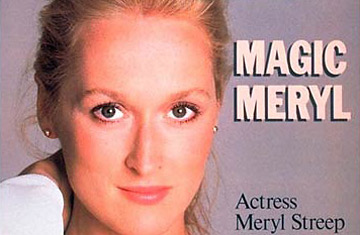
(5 of 9)
Singing was not enough, however; a complete transformation was required. The passage of time and the ingestion of enough peanut butter sandwiches usually do transform twelve-year-old children, of course. But Streep sees what she calls "my makeover" as a willed act, accomplished with contact lenses, a bottle of peroxide and an iron determination. By the time she entered Bernards High School in Bernardsville, N.J., she had indeed become "the perfect Seventeen magazine knockout," acting out what she calls "my first characterization; I played the blond homecoming queen for several years." It was not a mindless, giddy time, however; a highly developed sense of irony intruded, she says, with the result that "I haven't felt young since I was 13." But high school was an improvement. "I had friends, sort of." She was a cheerleader, she was popular with boys, and best of all, she was the star of all of the high school musicals. She had seen The Music Man on Broadway and had fallen in love with Star Barbara Cook. Now at 15, she won the Cook role of Marian the librarian.
"If I can locate the moment when I was first bitten, that was it," says Meryl. "The whole audience stood up when I came out. Mind you, I've never had that experience since. It must be like what Lady Diana felt on the balcony." English Teacher Jean Galbraith recalls dropping in on a rehearsal and hearing her sing Till There Was You. "I thought, that can't be the kid in the first row who sits next to the windows? I mean that's professional, that's fantastic." Brother Third, who played Winthrop, Marian's little brother, says that there was some jealousy when she went on to get the leads in Li'l Abner and Oklahoma. The present Bernards High drama teacher, a veteran road-company actor named Dick Everhart, happened to be applying for a job when Meryl played Laurie in Oklahoma. Her enormous natural gift was clear even then. Says he: "When she walked on the stage there was nobody else there."
Streep's career had begun, and its record since then has been a matter of theater people of increasing authority repeating those first cries of astonishment. She enrolled at Vassar, then a college for women. In the nonconformist atmosphere of the late 1960s she was able to slop around there in jeans, with an old felt hat pulled down to her ears, and drop her pom-pom girl impersonation for good. She established herself quickly as an actress at Vassar. She never seemed to care especially about being a star, recalls Clinton Atkinson, who directed her in the demanding lead role of Strindberg's Miss Julie. But it was clear that she would go beyond college theater. "Onstage," says Atkinson, "something happened within her that glowed. Men were always falling in love with her. I found her acting hair raising, absolutely mind-boggling."
After Vassar she toured Vermont colleges and ski areas for a few months with the Green Mountain Guild, a rep company, playing Shaw and Chekhov for $48 a week—"and it wasn't even the Depression." Then she made her commitment, and sent off an application to the Yale School of Drama. Yale awarded her a three-year scholarship and, as it turned out, the privilege of playing twelve to 15 roles a year.
